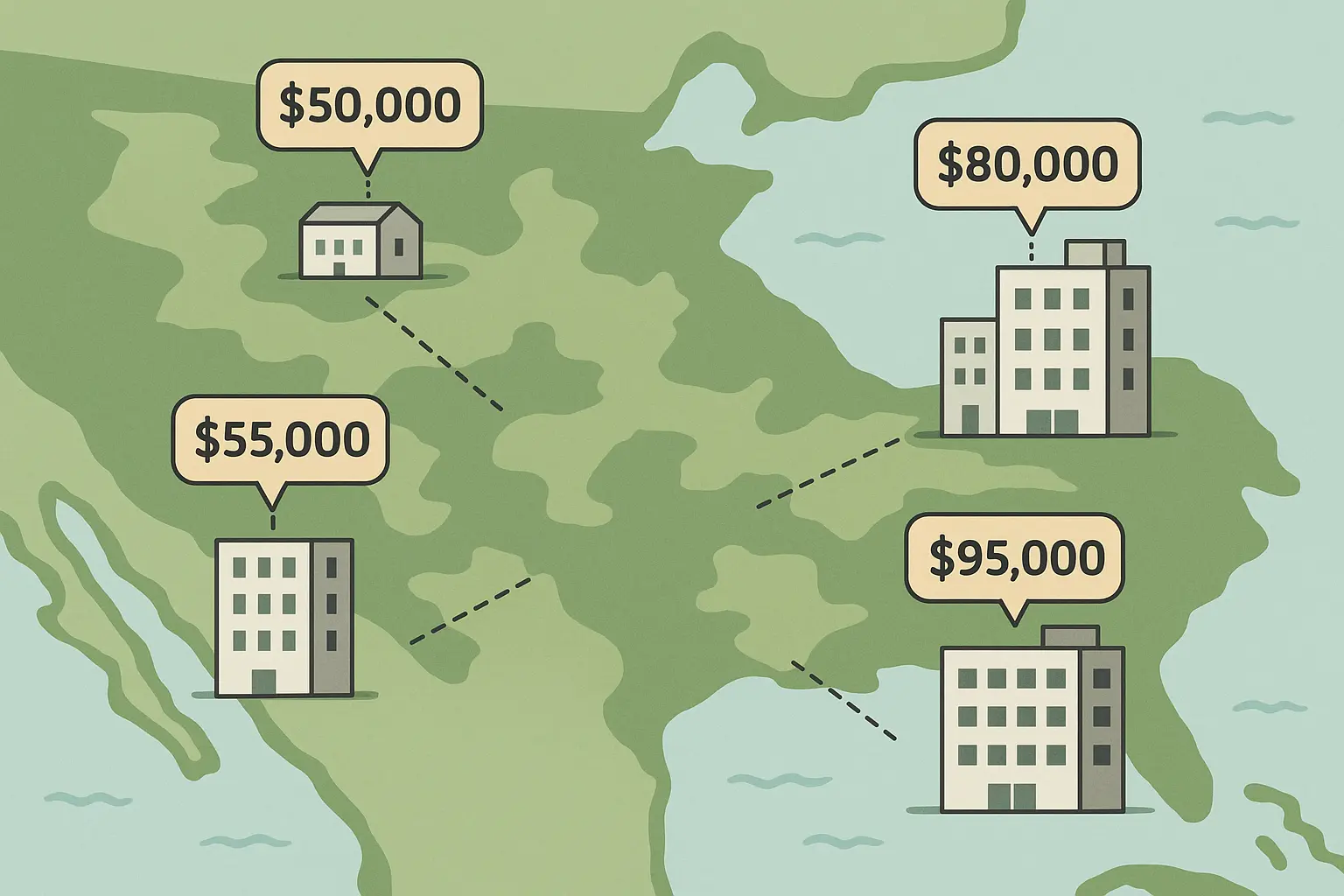How to Ask for a Raise Without Getting Shut Down (The Real Strategy That Actually Works)

Let’s be real – asking for a raise is scary as hell. According to a recent Equal Pay Day study by Credit Karma, 31% of women say they still don’t feel comfortable asking their employer for a raise, and plenty of men struggle with it too. Most of us know we deserve more money, but when it’s time to actually figure out how to ask for a raise, we completely freeze up.

Here’s what I’ve learned: asking for more money isn’t about begging or making demands. It’s about presenting a business case that makes saying no nearly impossible. When you approach it with the right preparation and timing, you’re having a professional conversation about fair compensation, not an uncomfortable confrontation.
The truth is, people who get raises successfully follow a proven system. They don’t wing it or hope for the best. They build an unshakeable case, time their request perfectly, and handle whatever response comes their way with confidence. That’s exactly what we’re going to cover.
Getting Your Ducks in a Row
Before you even think about scheduling that meeting with your boss, you need rock-solid preparation. Learning how to ask for a raise starts months before the actual conversation. I’ve seen too many people walk into salary conversations with nothing but hope and good intentions. That’s a recipe for disappointment.
The people who consistently get raises understand something crucial: the real work starts months before the actual conversation. They systematically document their contributions, research market rates, and build cases so compelling that managers struggle to find reasons to say no.
Turning Your Work Into Winning Evidence
Your daily contributions might feel routine to you, but they’re actually goldmine material for salary negotiations. The key is transforming your regular work activities into compelling proof of your value, complete with the numbers and metrics that make managers take notice.
Understanding how to calculate the financial impact of your contributions is crucial when learning how to ask for a raise and building your case, and utilizing a salary increase calculator can help you determine realistic targets based on your documented achievements and market research.
Most people make the mistake of trying to remember their accomplishments when it’s time for a raise discussion. Don’t be most people. Keep a running document (updated weekly) that tracks every project you complete, goal you exceed, and piece of positive feedback you receive.
Your achievement archive should include client testimonials, email praise from colleagues, revenue you’ve generated, costs you’ve saved, and processes you’ve improved. The key is specificity – “helped with marketing” becomes “developed email campaign that increased customer engagement by 35% and generated $50,000 in additional revenue.”
Transform every accomplishment into measurable impact. Instead of saying you “improved customer service,” document how you “reduced average response time from 48 hours to 12 hours, resulting in a 40% increase in customer satisfaction scores.”
Revenue generation, cost savings, efficiency improvements, and time reductions are your best friends here. Even if your role doesn’t directly touch sales, you can quantify your impact through productivity metrics, error reduction percentages, or team performance improvements you’ve influenced.
Sarah, a marketing coordinator, transformed her generic accomplishments into powerful negotiation ammunition. Instead of saying “I managed social media accounts,” she documented: “Grew Instagram following by 150% and LinkedIn engagement by 200%, resulting in 40 new qualified leads per month and $180,000 in attributed revenue over 12 months.” This specific, quantified approach helped her secure a 22% salary increase.
| Achievement Type | What to Document | Example Transformation |
|---|---|---|
| Revenue Generation | Dollar amounts, percentage increases | “Helped with sales” → “Generated $250,000 in new revenue through strategic client outreach” |
| Cost Savings | Money saved, efficiency gains | “Improved processes” → “Streamlined workflow reducing operational costs by $75,000 annually” |
| Team Performance | Productivity metrics, goal achievements | “Managed team well” → “Led team to exceed quarterly targets by 40% for three consecutive quarters” |
| Client Relations | Satisfaction scores, retention rates | “Good with clients” → “Maintained 95% client retention rate and improved satisfaction scores by 25%” |
| Process Improvements | Time saved, error reduction | “Made things better” → “Reduced processing time by 60% and decreased errors by 80%” |
Finding Out What You’re Really Worth
Guessing at salary numbers is a rookie mistake that can cost you thousands. Professional salary research goes far beyond a quick Google search, and when you negotiate without proper market data, you’re essentially flying blind.
Start with established platforms like Glassdoor, PayScale, and Salary.com, but don’t stop there. Industry-specific reports, professional association surveys, and networking conversations provide deeper insights into current market rates.
Pay attention to the methodology behind salary data. Some sources report base salary only, while others include bonuses and benefits. Understanding these distinctions helps you compare apples to apples and set realistic expectations for your negotiation.
According to UC Berkeley Executive Leadership, “Your boss will likely negotiate your initial salary request down so factor in about an additional 5% from your desired raise to leave room for negotiation”. This strategic positioning becomes crucial when you’re preparing your request.
Geographic salary variations can be substantial, but don’t automatically assume higher cost-of-living areas always mean proportionally higher salaries. Research local market conditions, industry presence, and competition for talent in your specific area.
Company size affects more than salary numbers – it influences bonus structures, benefits packages, equity opportunities, and advancement timelines. A smaller company might offer lower base pay but better growth potential, while larger organizations typically provide more structured compensation bands.
Don’t overlook specialized skills that drive business results. Technical certifications, bilingual abilities, industry expertise, leadership experience, and client relationship management all contribute to your premium positioning. These differentiators become powerful talking points during your negotiation.
When to Strike
Even the strongest case can fail with poor timing. I’ve watched people with excellent performance records get turned down simply because they chose the wrong moment to make their request. When you bring up salary matters just as much as how you present your case.
Successful salary negotiations aren’t about what you say – they’re about when you say it. You need to identify the optimal timing windows that align with company cycles, your personal achievements, and organizational priorities.
Finding Your Perfect Moment
Annual reviews create natural openings for compensation conversations because managers expect these discussions — and they’re often the best opportunity when you’re considering how to ask for a raise.. However, don’t wait until the review meeting itself to bring up salary – plant seeds earlier and use the formal review to reinforce your case.
Research from The Cut confirms that “If it’s been a year or more since your salary was last set, and if you’ve been doing excellent work during that time, it’s reasonable to ask to revisit your pay”. This timing aligns with professional standards and manager expectations.
Strike while your achievements are hot. Completing a major project, exceeding quarterly targets, or receiving industry recognition creates perfect timing for salary conversations. Your contributions are top-of-mind, and the business impact is immediately apparent.
Don’t let momentum fade. If you’ve just saved the company money, landed a big client, or solved a critical problem, schedule your salary discussion within 2-3 weeks while the positive impact is still fresh in everyone’s memory.
Mark, a software developer, waited just two weeks after successfully launching a critical system update that prevented potential downtime worth $500,000. His timing was perfect – the company’s gratitude was fresh, the financial impact was clear, and leadership was already discussing his contribution in meetings. He received approval for a 15% raise within the same week.
Reading the Company’s Financial Health
Your company’s financial health directly impacts their ability and willingness to approve salary increases. Learning to interpret the signals that indicate whether your organization is in a position to invest in employee compensation can make or break your request.
Positive earnings reports, new client acquisitions, expansion announcements, and increased hiring activity all suggest financial stability that supports salary increases. Pay attention to company communications, industry news, and internal announcements that reveal organizational health.
Green Light Indicators:
- Company reported positive quarterly results
- Recent major client wins or contract renewals
- Department exceeded performance goals
- No recent layoffs or budget cuts
- Your manager seems less stressed than usual
- You’ve completed a high-visibility project successfully
- Performance review cycle is approaching
When multiple items align, you’ve found your window to make your move with maximum likelihood of success.
Having the Conversation That Counts
How you present your case matters as much as what you’re asking for. I’ve seen people with mediocre achievements get substantial raises because they communicated brilliantly, while others with impressive track records got turned down due to poor presentation.
Whether you’re having the conversation in person or putting your request in writing, combining thorough preparation with confident delivery transforms what feels uncomfortable into a professional business discussion.
Owning the Face-to-Face Meeting
Face-to-face salary conversations remain the gold standard for negotiation success. There’s something powerful about sitting across from your manager, making eye contact, and presenting your case with confidence and professionalism.
Create a structured agenda that covers your key achievements, market research findings, and specific salary request. This is one of the most effective strategies for anyone figuring out how to ask for a raise in a professional way. Having a clear roadmap keeps the conversation focused and ensures you don’t forget important points under pressure.
Anticipate potential objections and prepare thoughtful responses. Common concerns include budget constraints, timing issues, or requests for additional responsibilities. Having ready answers demonstrates professionalism and shows you’ve considered their perspective.
Your professional presentation extends beyond the conversation itself, and having a well-crafted professional resume format ready demonstrates your commitment to career advancement and can support your case for increased compensation.
Start by expressing appreciation for the meeting opportunity and briefly acknowledging your manager’s leadership. This sets a collaborative tone and demonstrates respect for their time and position.
Present your achievements first, then transition to market research, and finally make your specific request. This logical flow builds your case systematically and makes your request feel natural rather than abrupt.
According to CareerFlow, “Aim for a raise that is in line with industry standards; typically, it ranges from 3% to 5%”, though you can justify higher percentages with exceptional performance and additional responsibilities.
Jennifer prepared for her raise conversation by creating a simple one-page document highlighting her three biggest wins: leading a cross-departmental project that saved $200,000, training two new team members who became top performers, and maintaining 100% client retention in her portfolio. She practiced her 5-minute presentation twice, anticipated budget concerns, and prepared alternative compensation options. The meeting lasted 12 minutes and resulted in an 18% increase plus additional professional development funding.
Putting It in Writing That Works
Written communication serves as important documentation and can be highly effective for initial requests or follow-up discussions. Email requests require different skills than in-person conversations, but they can be equally powerful when done correctly.
Your subject line sets the tone for the entire interaction. “Request for Salary Review Meeting” is clear and professional without being presumptuous or demanding. Avoid vague subjects or overly direct ones that might put your manager on the defensive.
Structure your email with a professional greeting, brief context about your tenure and contributions, specific achievement highlights, market research summary, and a clear request for a meeting to discuss compensation. Keep it concise but comprehensive.
As financial expert Haley Sacks notes, “all the research around equal pay comes down to the power of the individual. It will only be solved by individuals closing their own gaps”. Taking initiative in salary negotiations contributes to broader workplace equity.
Focus on business impact rather than personal needs. Frame your request around the value you provide and the return on investment your salary increase represents to the organization.
Handling Whatever Comes Next
Your manager’s response opens the real negotiation phase. How you handle this moment often determines whether you get what you want, something close to it, or nothing at all.
Be prepared for any response. The most successful negotiations happen when you’ve anticipated different scenarios and have strategies ready for each one.
When Things Go Your Way
Positive responses require careful handling to ensure you get the best possible outcome and proper implementation. Don’t get so excited about hearing “yes” that you forget to nail down the details.
Look beyond the base salary number to evaluate the complete compensation package. Benefits improvements, bonus opportunities, equity grants, and professional development funding can add significant value to your overall compensation.
Consider the timing and structure of the increase. A 10% raise effective immediately differs from a 10% raise spread over 12 months or tied to performance milestones. Understand exactly what you’re accepting before you agree.
| Response Type | What It Means | Your Next Steps |
|---|---|---|
| Immediate Yes | Manager has authority and budget | Express gratitude, confirm details in writing |
| “Let me think about it” | Needs time to consider or get approval | Set follow-up timeline, provide supporting materials |
| Counter-offer | Willing to negotiate at different terms | Evaluate total package value, consider compromising |
Turning “No” Into “Not Yet”
Rejection doesn’t mean failure – it means you need a different strategy. The people who eventually get substantial raises often face initial setbacks but use them as learning opportunities.
Ask for specific timelines and milestones that would trigger salary reconsideration. This might be quarterly reviews, completion of certain projects, or achievement of specific performance metrics.
Document these agreements in writing through follow-up emails that confirm the discussion and establish mutual expectations. This creates accountability and shows your professionalism in handling the situation.
As Credit Karma’s Chief People Officer Colleen McCreary advises, “You have to ask for pay transparency at the corporate level”. Understanding salary structures and decision-making processes can help you navigate future opportunities more effectively.
Budget constraints don’t always mean no additional compensation is possible. Flexible work arrangements, additional vacation time, professional development funding, conference attendance, or equipment upgrades can provide meaningful value when salary budgets are tight.
Alternative Compensation Options:
- Additional paid time off days
- Flexible work-from-home arrangements
- Professional development budget
- Conference attendance funding
- Performance-based bonus structure
- Earlier performance review schedule
Making It About Business Value
Calculate and present the return on investment your contributions generate. If your work saves the company $100,000 annually, a $10,000 salary increase represents a 10:1 ROI that’s hard to argue against.
Connect your request to business objectives and company priorities. If the organization is focused on customer retention, emphasize how your work contributes to that goal and why investing in your compensation supports their strategic initiatives.
Phased increase proposals spread the financial impact over time while giving you immediate progress toward your goal. You might negotiate a 5% increase now with another 5% in six months based on continued performance.
Performance-linked incentives align your compensation growth with measurable business results, making it easier for managers to approve because the company only pays more when they receive more value.
Building Your Long-Term Success Strategy
Salary negotiations aren’t one-time events – they’re part of your ongoing career development strategy. The most successful people view compensation discussions as stepping stones in their career journey rather than isolated incidents.
When compensation requests connect to broader professional growth planning, they create pathways for continued advancement and feel natural rather than awkward.
Connecting Raises to Career Growth
Research which certifications, training programs, or skills command premium compensation in your field. Industry-specific credentials, technical certifications, and leadership development programs often justify immediate salary increases.
Calculate the return on investment for professional development activities and present them as value-adds during salary discussions. If a certification typically increases earning potential by 15%, that becomes part of your negotiation case.
For professionals in specialized fields, understanding specific salary benchmarks for certified roles can provide valuable context when building your case for compensation increases based on additional certifications or specialized training.
Identify the specific responsibilities, skills, and achievements required for the next level in your career path. Use this information to volunteer for stretch assignments that demonstrate readiness for advancement and corresponding salary increases.
Leadership opportunities, cross-functional projects, and mentoring responsibilities all signal promotion readiness while providing concrete achievements to support salary requests.
Understanding advancement requirements within your organization helps you connect current salary requests to future promotional opportunities and long-term earning potential.
Having a strong resume foundation makes all the difference when you’re building your case for a raise. Resume Builder IQ’s ATS-friendly resume formats help you document and articulate your professional achievements in the most compelling way possible – the same metrics and accomplishments you’ll need for your salary negotiation.
The platform’s industry-specific bullet points and achievement-focused descriptions help you identify and quantify your contributions, while the professional templates demonstrate your commitment to career advancement. As you negotiate for higher compensation, you’re also positioning yourself for future opportunities, and Resume Builder IQ ensures you’re always ready to capitalize on new possibilities that your increased value might unlock.
For healthcare professionals looking to maximize their earning potential, understanding specialized salary structures and negotiation strategies can provide additional leverage when requesting compensation increases in clinical or administrative roles.
Final Thoughts
Asking for more money isn’t about getting a handout – it’s about recognizing and advocating for your professional worth. The strategies in this guide work because they focus on building genuine value, timing requests strategically, and maintaining professionalism throughout the process.
The key to successful salary negotiations lies in preparation, timing, and professional communication. By documenting your achievements, researching market rates, and approaching conversations with confidence and data, you transform what feels uncomfortable into a business discussion about fair compensation.
Your career growth and financial success depend on your willingness to advocate for yourself. Every raise you secure improves your current situation and sets a higher baseline for future opportunities. The skills you develop through salary negotiations – research, communication, and professional confidence – serve you throughout your entire career journey.
Start building your case today, even if you’re not ready to make your request immediately. The people who consistently earn more are those who continuously document their value, stay informed about market rates, and approach compensation discussions as routine business conversations rather than uncomfortable confrontations.
Remember: you’re not asking for a favor. You’re presenting a business case for fair compensation based on the value you provide — and once you understand how to ask for a raise with confidence, that conversation becomes much easier to have.









